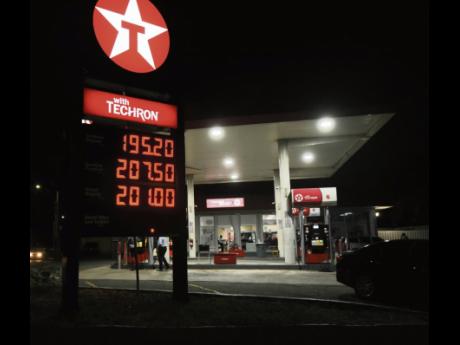GAS PAIN
Hike in pump prices rocks motorists, businesses
Motorists and businesses have been hit by spiralling fuel prices, and industry interests are clamouring for intervention amid an overall 10.8 per cent jump at the pump over the last nine weeks.
Operators of diesel vehicles have borne the greatest punishment with a 13.4 per cent rise since December 9 and could face more pain when new rates are announced by Petrojam this afternoon.
The prices of 87 and 90 gasolene have climbed 9.7 per cent and 9.2 per cent over the period December 9, 2021, to February 3, 2022.
CEO of National Baking Company, Butch Hendrickson, told The Gleaner that fuel has cost his company approximately $750,000 more, per month, over the last five months.
That’s despite a major investment in trucks that are more efficient, utilising 33 per cent less fuel than before.
“We try to buy carefully because we have our own tanks. Over the years, we have changed every burner in every oven or modified them to be way more efficient,” said Hendrickson.
President and CEO of the Jamaica Broilers Group, Christopher Levy, said fuel prices have impacted the cost of doing business in Jamaica.
In January, Jamaica Broilers increased its chicken prices by 10 per cent amid a global supply-chain crisis that has caused a spike in the cost of shipping and grain.
Levy said it was too early to make an assessment of the specific impact of fuel costs on its operation.
“Everything adds up, and what we need to recognise is that we are not out of the woods as a country with this inflationary pressure as yet,” he said.
The Government collects billions each year from a special tax on each litre of fuel but the Opposition People’s National Party has appealed for the removal of the tariff amid soaring prices at the pump.
In mid-June last year, Phillip Paulwell, the opposition spokesperson on energy, called for the Government to remove the fuel tax to offer immediate relief to Jamaicans amid the COVID-19 pandemic.
“The poor and our middle class can’t bear any more. Many are at the breaking point. It’s time for the Government to listen and respond to the plight of our people,” Paulwell said then. At that time, refinery costs for 87, 97 and auto diesel were selling for $149, $155 and $142 per litre, respectively.
According to Petrojam’s most recent fuel prices on February 3, 87, 90, and diesel cost $174, $179, and $174 per litre, respectively.
President of the Jamaica Gasolene Retailers Association (JGRA), Dianne Parram, said her association wants the Government to look at the price mechanism and the tax component of the ex-refinery price.
“To our knowledge and understanding, there are more than 45 per cent taxes. There’s the SCT, the ad valorem, and there’s the hedge tax, and those are all before we arrive at the ex-refinery price. Our concern is that even corporate tax is lower than 45 per cent, and we are asking the ordinary man in the street to bear a tax of 45 per cent on gasolene,” Parram said.
She added that her members are operating on slim profit margins, which will have a “deleterious impact” on service station stakeholders.
Parram explained that with most Jamaicans having a fixed disposable income, higher gas prices simply mean that they will purchase what they can afford, therefore reducing the volume of gas sold by service stations.
“On top of a meagre margin, their profitability will be significantly reduced. Since COVID, some of our members have exited the trade for a number of factors. This January has been one of the worst the sector has ever seen, because it was the height of the fourth wave. There were also work-from-home and online classes, so the commuting public was significantly reduced,” Parram said.
Meanwhile, public relations officer at the National Consumers’ League, Trevor Samuels, said he would not support full removal of the gas tax, but is lobbying for a 50 per cent cut.
“If we can get better roads with the money and the Government tells us what portion of the taxes will be used to do those sorts of things, I’m sure the people will be better off in the long run. If they have to pay that for gas, they would save on car parts.
“If toll rates are held firm for a little while longer, it might also help, and these things can balance back out to motorists and consumers in terms of the gas prices,” Samuels explained.
Economist Dr Andre Haughton, who also weighed in on the matter, said in most production processes, whether transportation, manufacturing or business process outsourcing, energy plays a role in input prices.
He said investment in renewable energy can lower the cost of fuel.
“At the pump, we have marketing companies, so if we were to get our own domestic marketing companies that are not so exorbitant, probably that will reduce some of the franchising fees, but it has to be fixed at Petrojam,” Haughton said in a Gleaner interview.
“If we continue to operate an oil refinery that is inefficient, then it is always going to give the increased costs to the marketing companies, which will ultimately be transferred to consumers,” he added.

